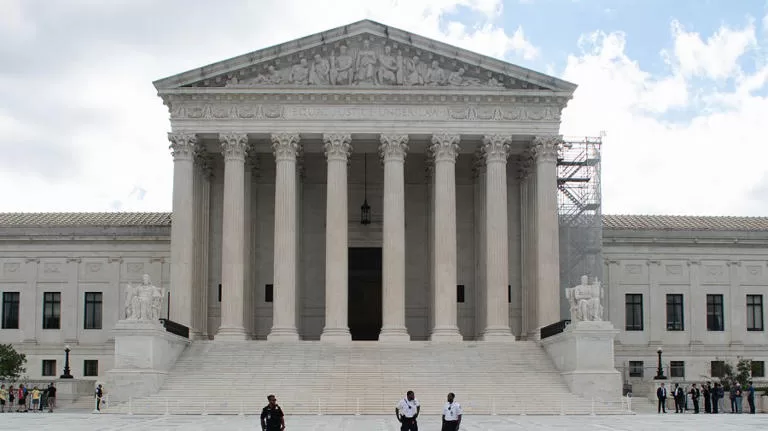Introduction: US Mexico Gun Lawsuit
In a significant legal showdown, the U.S. Supreme Court announced on October 4, 2024, that it will review a $10 billion lawsuit filed by the Mexican government against prominent U.S. gun manufacturers. This lawsuit alleges that companies such as Smith & Wesson, Glock, Barrett Firearms, Colt, and Beretta have engaged in negligent and illegal commercial practices that have exacerbated violence in Mexico.

The Context of the Lawsuit
This lawsuit, initiated in Boston in August 2024, highlights a critical issue—the flow of weapons across the border into Mexico. The Mexican government claims that approximately 70% of firearms used in drug-related violence come from the United States, with a staggering 17,000 homicides in 2019 linked to trafficked weapons. Alejandro Celorio, a legal advisor to the Mexican government, emphasizes the substantial economic toll, estimating that the consequences of gun violence could amount to 1.7% to 2% of Mexico’s Gross Domestic Product (GDP).
The Response from the Firearms Industry
In response to the lawsuit, the National Shooting Sports Foundation, representing the firearms industry, vehemently denied the allegations. Lawrence Keane, the group’s senior vice-president and general counsel, pointed out that the root causes of crime in Mexico are systemic corruption and governance issues, arguing that the lawsuit distracts from these fundamental problems.
The Legal Journey So Far
The case has had a tumultuous legal journey. Initially dismissed by a district court, it was revived by the First Circuit Court of Appeals, prompting gun manufacturers to appeal to the Supreme Court. They contend that they have adhered to lawful practices and argue that the lawsuit should not be heard in U.S. courts. In August, Judge Dennis Saylor dismissed the case against six of the eight companies involved, citing insufficient evidence linking the violence in Mexico to the alleged negligence of U.S. manufacturers.
Mexico’s Argument Against U.S. Gunmakers
The Mexican government asserts that U.S. gun manufacturers are fully aware of the distribution chain leading to gun sales that ultimately reach “straw buyers,” who then funnel weapons to drug cartels. They argue that many military-style weapons lack easily traceable serial numbers, further complicating accountability.
On the other side, attorneys for Smith & Wesson argue that the Mexican government is leveraging the American legal system to undermine the firearms industry through what they term a “novel and far-fetched” legal claim. They draw parallels to liquor sales, suggesting that gun manufacturers should not be held accountable for the actions of third-party dealers.
Broader Implications of Gun Trafficking
This lawsuit is not isolated to Mexico. A recent UN report indicates that half a million legal and illegal weapons have flooded into Haiti since 2020, fueling instability and gang violence. In response, the U.S. State Department plans to establish a new policing unit in Haiti to tackle the issue of trafficked weapons.
Timeline of Events
- August 2024: Mexico files a $10 billion lawsuit against U.S. gun manufacturers in Boston.
- September 2024: The case is initially dismissed by a district court.
- October 4, 2024: The U.S. Supreme Court agrees to hear the appeal from gun manufacturers regarding the lawsuit.
Expert Opinions
Experts from various fields have weighed in on the implications of this landmark lawsuit. Dr. Ricardo Gonzalez, a political analyst specializing in U.S.-Mexico relations, stated, “This case highlights the complexities of gun control and the responsibilities of manufacturers in the face of rampant violence. It could set a precedent that reshapes not only gun laws but also international relations.”
Professor Maria Reyes, an economist, added, “The financial implications for both countries are immense. The potential damages claimed by Mexico could lead to significant changes in how the gun industry operates, affecting jobs and regulations on both sides of the border.”
Conclusion
As the U.S. Supreme Court prepares to deliberate on this crucial case, the implications extend far beyond legal boundaries, touching on international relations, gun control, and public safety. The outcome could potentially reshape the landscape of gun manufacturing and distribution, impacting not only the U.S. but also its southern neighbor grappling with rampant violence linked to drug cartels. The world watches closely as both nations confront the complex issues of responsibility, accountability, and the tragic consequences of gun trafficking.
For Regular News and Updates Follow – Sentinel eGazette
FAQs
Q1: What are the key allegations in the lawsuit against U.S. gun manufacturers?
A1: The lawsuit claims that U.S. gun manufacturers have engaged in negligent practices that facilitate the illegal trafficking of firearms to drug cartels in Mexico, leading to significant violence.
Q2: How does this lawsuit impact U.S.-Mexico relations?
A2: The lawsuit could strain diplomatic relations as it highlights issues of accountability and gun control, raising tensions regarding the flow of arms across the border.
Q3: What role do straw buyers play in gun trafficking?
A3: Straw buyers are individuals who purchase firearms legally but have no intention of keeping them. They often sell these weapons to criminals, including drug cartels, exacerbating gun violence.
Q4: What are the potential outcomes of the Supreme Court’s decision?
A4: Depending on the ruling, the decision could establish legal precedents regarding the accountability of gun manufacturers, potentially affecting gun laws and industry regulations in the U.S.
Q5: What measures is the U.S. taking to address gun trafficking?
A5: The U.S. State Department has indicated plans to implement new policing units to combat weapons trafficking, particularly in regions like Haiti experiencing gang violence.